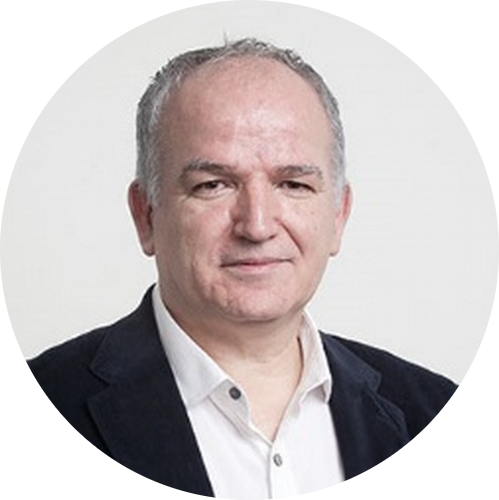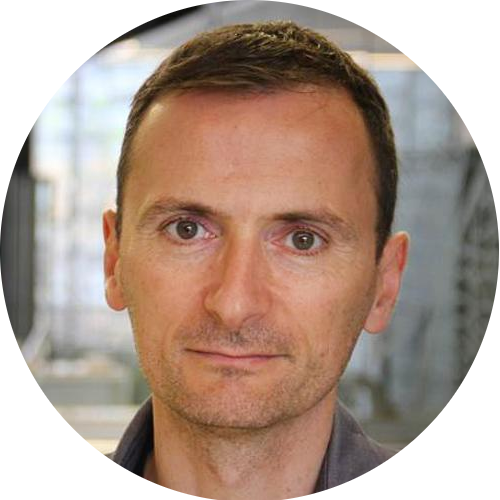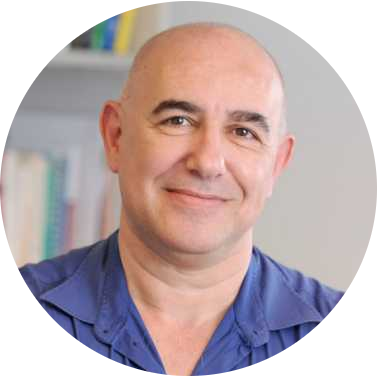The Department of Information Engineering is proud to present the Distinguished Lecturer Series 2019 The Distinguished Lecturer Series, active since 2004, is an annual program of high impact lectures where internationally renowned scholars are invited to discuss cutting-edge research in ICT and neighboring disciplines. While aiming at scientific excellence, our lectures are typically open to the general public as well.
We are looking forward to meeting you in our upcoming events.
www.dei.unipd.it/distinguished
 Nanobiosensors design and applications in diagnostics
Nanobiosensors design and applications in diagnostics
Wednesday, Jan 16, 2019 - 14:00
Aula Magna A. Lepschy, Dept. of Information Engineering
Arben Merkoçi
ICN2 - Catalan Institute of Nonoscience and Nanotechnology, Autonomous University of Barcelona, Spain
Short bio & Abstract
 Talking to Machines: From MUSA to the Google Assistant
Talking to Machines: From MUSA to the Google Assistant
Wednesday, Mar 6, 2019 - 14:00
Aula Magna A. Lepschy, Dept. of Information Engineering
Roberto Pieraccini
Google, Zurich, Switzerland
Short bio & Abstract
 What can and cannot be said about randomness in quantum physics
What can and cannot be said about randomness in quantum physics
Monday, May 20, 2019 - 14:00
Aula Magna A. Lepschy, Dept. of Information Engineering
Toni Acin
ICFO - The Institute of Photonic Sciences
Short bio & Abstract
 Cybergenetics: building novel genetic feedback control systems for living cells
Cybergenetics: building novel genetic feedback control systems for living cells
Monday, Sept 23, 2019 - 14:00
Aula Magna A. Lepschy, Dept. of Information Engineering
Mustafa Khammash
ETH, Zurich, Switzerland
Short bio & Abstract
SHORT BIOS and ABSTRACTS
Nanobiosensors design and applications in diagnostics
Wednesday, Jan 16, 2019 - 14:00
Aula Magna A. Lepschy, Dept. of Information Engineering
Arben Merkoçi
ICN2 - Catalan Institute of Nonoscience and Nanotechnology, Autonomous University of Barcelona, Spain
Short Bio: Arben Merkoçi is currently ICREA Professor and director of the Nanobioelectronics & Biosensors Group at Institut Català de Nanociencia i Nanotecnologia (ICN2), part of Barcelona Institute of Science and Technology (BIST). After his PhD (1991) at Tirana University (Albania), in the topic of Ion-Selective-Electrodes (ISEs) Dr. Merkoçi worked as postdoc and senior researcher/invited professor in the field of nanobiosensors and lab-on-a-chip technologies in Italy, Spain, USA and since 2006 at ICN2. Prof. Merkoçi research is focused on the design and application of cutting edge nanotechnology and nanoscience based cost/efficient biosensors. The paper/plastic-based nanobiosensors involve integration of biological molecules (DNA, antibodies, cells and enzymes) and other (bio)receptors with micro- and nanostructures/motors and applied in diagnostics, environmental monitoring or safety and security. He has published around 280 peer review research papers, supervised 27 PhD students and has been invited to give plenary lectures and keynote speeches in around 150 occasions in various countries.
Prof. Merkoçi is Editor of Biosensors and Bioelectronics, the principal international journal devoted to research, design development and application of biosensors and bioelectronics, member of editorial board of Electroanalysis, Microchimica Acta and other journals.
He is also involved in teaching PhD courses in field of nanomaterials based biosensors in several Spanish and international centres, has been member of commission for establishing of the new Nanoscience and Nanotechnology undergraduate academic curricula at UAB, the first one in Spain started during the academic year 2010-2011 and currently acts as coordinator of “Nano for Diagnostics” master module at UAB. He is currently member of the Academics Working Group of BIST. Prof. Merkoçi has supervised 25 PhD students besides several national & international postdoctoral and other researchers in his lab and has been member or head of more than 30 PhD panels in various countries. He has got several national and international grants related to nanomaterials application in biosensors and his group is collaborating with several worldwide leading labs in the field of nanobiosensors. Prof. Merkoçi serves also as scientific evaluator and member of panels of experts of various international governmental and nongovernmental agencies (FP EU, USA, various EU and other countries), member of scientific committee of various international congresses, director of several workshops and other scientific events
He is co-founder of two spin-off companies, PaperDrop dedicated to nanodiagnostics and GraphenicaLab to electronic printing.
Abstract: There is a high demand to develop innovative and cost effective devices with interest for health care beside environment diagnostics, safety and security applications. The development of such devices is strongly related to new materials and technologies being nanomaterials and nanotechnology of special role. We study how new nanomaterials such as nanoparticles, graphene, nano/micromotors can be integrated in simple sensors thanks to their advantageous properties. Beside plastic platforms physical, chemical and mechanical properties of cellulose in both micro and nanofiber-based networks combined with their abundance in nature or easy to prepare and control procedures are making these materials of great interest while looking for cost-efficient and green alternatives for device production technologies. Both paper and nanopaper-based biosensors are emerging as a new class of devices with the objective to fulfil the “World Health Organization” requisites to be ASSURED: affordable, sensitive, specific, user-friendly, rapid and robust, equipment free and deliverable to end-users. How to design simple paper-based biosensor architectures? How to tune their analytical performance upon demand? How one can couple nanomaterials such as metallic nanoparticles, quantum dots and even graphene with paper and what is the benefit? How we can make these devices more robust, sensitive and with multiplexing capabilities? Can we bring these low cost and efficient devices to places with low resources, extreme conditions or even at our homes? Which are the perspectives to link these simple platforms and detection technologies with mobile communication? I will try to give responses to these questions through various interesting applications related to protein, DNA and even contaminants detection all of extreme importance for diagnostics, environment control, safety and security.
Talking to Machines: From MUSA to the Google Assistant
Wednesday, Mar 6, 2019 - 14:00
Aula Magna A. Lepschy, Dept. of Information Engineering
Roberto Pieraccini
Google, Zurich, Switzerland
Short Bio: Roberto Pieraccini is a technology expert in the fields of speech recognition, natural language, dialog, and human-machine interaction. He worked as a researcher at CSELT (Torino, Italy), Bell Laboratories (Murray Hill, NJ), AT&T Shannon Laboratories (Florham Park, NJ), SpeechWorks International (now Nuance), and IBM T.J. Watson Research (Yorktown Heights, NY). In 2005 he was Chief Technology Officer at SpeechCycle, a company specializing in sophisticated technical support systems based on voice recognition technology. In 2012-2013 he was the director and CEO of the International Computer Science Institute (ICSI), at Berkeley, CA. Between 2014 and 2018 he was Director of Advanced Conversational Technology at Jibo, Inc., the pioneer of the first consumer social robots for the home. From March 2018 he is Director of Engineering at Google in Zurich, where he leads the development of the Personal Google Assistant. He is the author of “The Voice in the Machine: Building Computers that Understand Speech,” published by MIT Press, a general audience book on the history and technology of human machine speech interaction. He is a fellow of IEEE and ISCA, a member of the AVIOS board, and a member of the editorial board of several scientific and technology magazines. More information at http://robertopieraccini.com/.
Abstract: For more than three decades Roberto Pieraccini has been actively working towards the goal of building machines that can intelligently converse with humans using speech. The technologies that enable a machine to recognize the words of an utterance, understand its meaning, decide how to act on that, perform an action and generate a spoken message back to a user where very limited thirty years ago. In spite of those limitations, with the help of good design practices, effective tools, smart usage of data and machine learning, we relentlessly made strides in advancing the performance and bringing measurable value to users. The dream of a human-like automated agent has not been fully realized yet, and many problems remain to be solved, but we are at a time in history when those technologies can enable a machine like the Google Assistant to be light years ahead in performance and sophistication as compared with analogous efforts of the past.
This talk is about the story of that journey, the problems encountered and the solutions that helped shape today’s technology landscape in this area. It is the story of the relentless improvement of the spoken human-machine technology, until today’s successes and beyond. With today’s systems like Google Assistant we are at turning point. The integration of sophisticated machine learning with incredibly large amounts of data and hundreds of systems and services is bringing the sophistication of virtual assistants to a level unseen before. This talk will give an idea of the current status and the future of the machines who talk.
What can and cannot be said about randomness in quantum physics
Monday, May 20, 2019 - 14:00
Aula Magna A. Lepschy, Dept. of Information Engineering
Toni Acin
ICFO - The Institute of Photonic Sciences
Short Bio:
Antonio Acín is an ICREA Research Professor at ICFO-The Institute of Photonic Sciences. He has a degree in Physics from the Universitat de Barcelona (UB) and in Telecommunication Engineering from the Universitat Politècnica de Catalunya. He got his PhD in Theoretical Physics in 2001 from the UB. After a post-doctoral stay in Geneva, in the group of Prof. Gisin (GAP-Optique), he joined ICFO in 2003. At ICFO, Acín leads the Quantum Information Theory group. His research has been awarded with 3 grants from the European Research Council: 1 Starting, 1 Proof of Concept and 1 Consolidator Grant, the latter starting in 2014. He also received an AXA Chair in Quantum Information Science in 2016.
Abstract:
It is usually said that quantum physics is random. But, what does this exactly mean? We show how randomness in quantum physics follows as a consequence of the violation of Bell inequalities. Then, we move from foundations to applications and discuss how this property can be exploited to design novel quantum cryptography protocols for randomness generation and secure key distribution. These protocols are said to be device independent, in the sense that to prove their security one only needs the observation of Bell inequality violation but no assumptions on the devices used to implement the protocol. From a general perspective, the device-independent approach provides a new approach for quantum cryptography in which devices can simply be seen as quantum black boxes processing classical information and security can be certified solely by the observed statistics.
Cybergenetics: building novel genetic feedback control systems for living cells
Monday, Sept 23, 2019 - 14:00
Aula Magna A. Lepschy, Dept. of Information Engineering
Mustafa Khammash
ETH, Zurich, Switzerland
Short Bio: Mustafa Khammash is the Professor for Control Theory and Systems Biology at the Department of Biosystems Science and Engineering at ETH Zurich, Switzerland. He works in the areas of control theory, systems biology, and synthetic biology. His lab develops theoretical, computational, and experimental methods aimed at understanding the role of dynamics, feedback, and randomness in biology. He is currently developing new theoretical and experimental approaches for the design of biomolecular control systems and for their realization in living cells. Prof. Khammash received his B.S. degree from Texas A&M University in 1986 and his PhD from Rice University in 1990, both in electrical engineering. In 1990, he joined the engineering faculty of Iowa State University, where he created the Dynamics and Control Program and led the control group until 2002. He then joined the engineering faculty at the University of California, Santa Barbara (UCSB), where he was Director of the Center for Control, Dynamical Systems and Computation (CCDC) until 2011 when he joined ETH Zurich. Khammash is the recipient of the European Research Council ERC-Advanced grant. He is a Fellow of the IEEE, IFAC, and the Japan Society for the Promotion of Science (JSPS).
Abstract: Humans have been influencing the DNA of plants and animals for thousands of years through selective breeding. Yet it is only over the last 3 decades or so that we have gained the ability to manipulate the DNA itself and directly alter its sequences through the modern tools of genetic engineering. This has revolutionized biotechnology and ushered in the era of synthetic biology. Among the possible applications enabled by synthetic biology is the design and engineering of feedback control systems that act at the molecular scale in real-time to steer the dynamic behavior of living cells. Here I will present our theoretical framework for the design and synthesis of such control systems, and will discuss the main challenges in their practical implementation. I will then present the first designer gene network that attains integral feedback in a living cell and demonstrate its tunability and disturbance rejection properties. A growth control application shows the inherent capacity of this integral feedback control system to deliver robustness, and highlights its potential use as a universal controller for regulation of biological variables in arbitrary networks. Finally, I will discuss the potential impact of biomolecular control systems in industrial biotechnology and medical therapy and bring attention to the opportunities that exist for control theorists to advance this young area of research.